Yes, you can have a garbage disposal with a septic tank; however, it requires careful use to avoid problems. This article explains how “can you have a garbage disposal with a septic tank” affects your septic system, the precautions you need to take, and tips for maintaining both systems effectively.
Key Takeaways
- Integrating a garbage disposal with a septic tank is possible but requires careful usage and planning to avoid overwhelming the system.
- Using a garbage disposal can lead to increased sludge accumulation in septic tanks, necessitating more frequent pumping and higher maintenance costs.
- Following specific guidelines on what food waste to process and using specialty disposals can enhance the compatibility of garbage disposals with septic systems.
Understanding Garbage Disposals and Septic Tanks
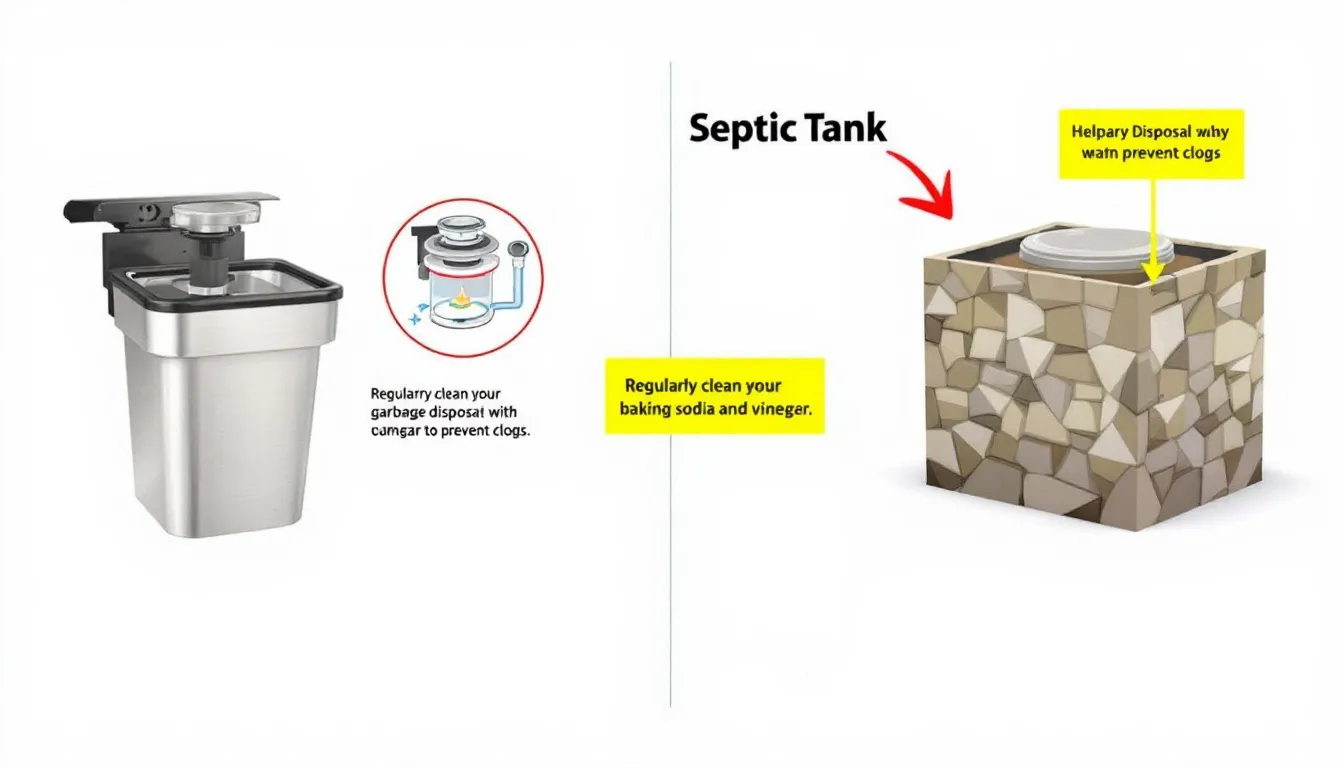
Garbage disposals, which facilitate kitchen cleanliness by finely grinding food waste into tiny fragments and thereby reducing the amount of trash sent to landfills, are an exceptional convenience. Conversely, septic systems—which include both a septic tank system and a drainage area—are integral for handling domestic waste where municipal sewer systems are not available. These tanks decompose solids while treating wastewater with bacteria before releasing the liquid effluent into the drain field.
Incorporating a garbage disposal within a septic system is certainly doable, but requires deliberate consideration and planning. Comprehending how each of these systems functions assists in maintaining them properly and averting potential problems. It’s crucial for homeowners to grasp the intricacies involved so that they can make educated decisions that help prevent expensive errors regarding their disposal and waste management needs.
The Impact of Garbage Disposals on Septic Systems
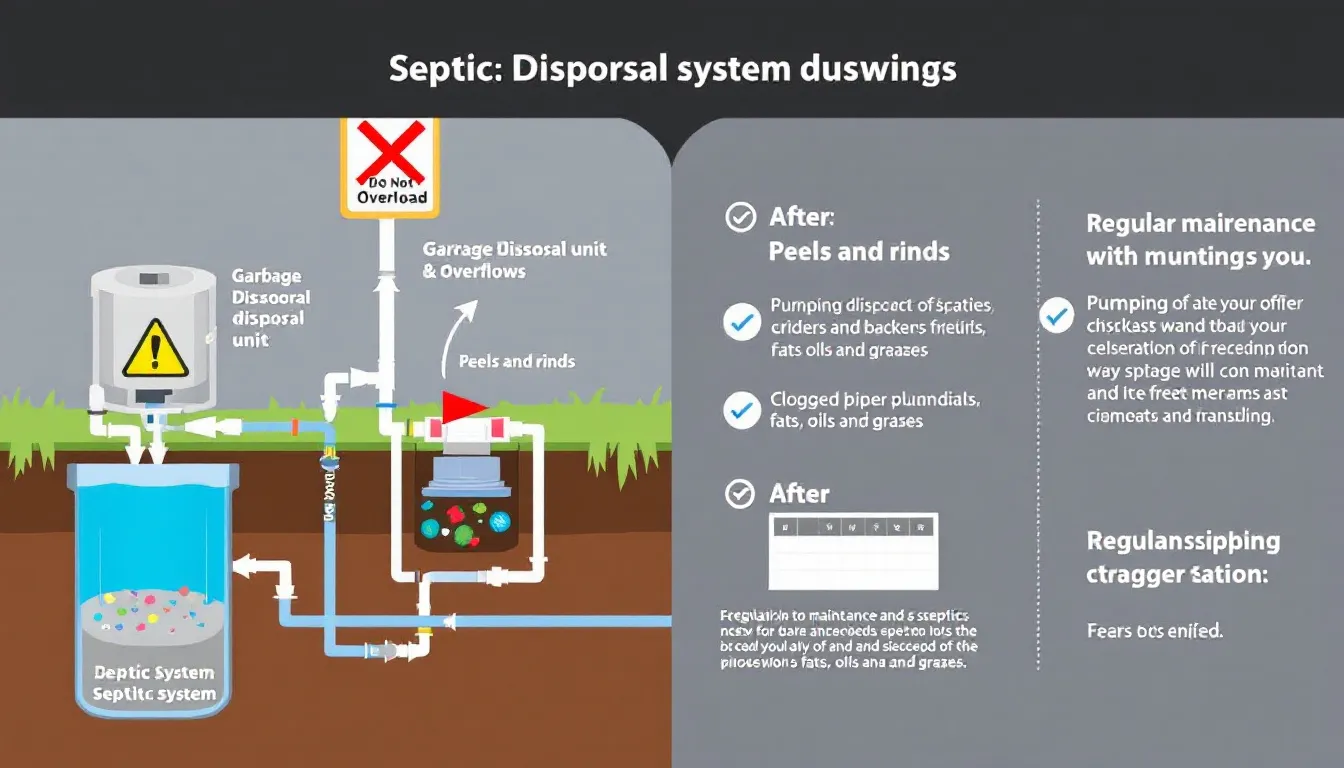
Garbage disposals are designed to efficiently grind food scraps, making them easier to transport through pipes into a septic system. The nature of food waste, primarily composed of water, facilitates quicker decomposition when compared with other types of refuse. Nevertheless, frequent use of a garbage disposal can strain the bacteria in the septic tank that break down waste.
The consequence is an increased buildup of sludge within the tank which can require more regular pumping than normally expected—potentially doubling it—which may raise maintenance expenses over time. As such, although it’s handy to have a disposal connected to your septic system for managing food leftovers, prudent operation is advised so as not to overload its capabilities.
Precautions When Using a Garbage Disposal with a Septic Tank
It’s crucial to minimize the quantity of food waste that goes through your garbage disposal in order to maintain a well-functioning septic system and prevent accelerated accumulation of sludge. Using cold water while the disposal is operating assists in preventing waste from adhering to pipes, which could lead to blockages.
Do not introduce non-biodegradable items into your garbage disposal because they can cause significant issues within your septic system. Implementing a strainer helps capture substantial food particles before entering the disposal, offering additional protection for your system.
Adhering to these recommendations will aid in keeping both your garbage disposal and septic system operating efficiently. It’s also important to manage waste appropriately and ensure that you use the disposal on a regular basis.
What Foods Can Go Down the Disposal?
Not all food scraps are created equal when it comes to garbage disposals connected to septic systems. Soft fruits and non-fibrous vegetables are generally safe.
However, there are specific categories of food waste that you should be mindful of.
Easily Biodegradable Food Scraps
Food scraps that break down easily are beneficial for disposal systems linked to septic tanks because they decompose swiftly and help prevent the accumulation of waste that cannot decompose. Such items typically encompass fruits, vegetables, and prepared grains. Modest quantities of bread and pasta can be safely disposed of in this manner.
Citrus rinds, eggshells, and coffee grounds can also be introduced into your septic system in limited amounts as they effectively degrade without leading to clogs. Utilizing these types of biodegradable food assists in maintaining a well-functioning septic system.
Foods to Avoid
Certain items should not be disposed of in systems with a septic connection, namely:
- Coffee grounds
- Eggshells
- Fats
- Oils
- Grease
- Nuts
- Fruit pits
Pasta, rice, and oats can absorb water and expand leading to blockages.
Vegetables with fibrous textures such as celery along with corn husks may obstruct the disposal mechanism and impede the septic system. It is important to steer clear of non-food materials like plastic or paper towels since they fail to break down easily. Exercise vigilance to prevent obstruction and ensure your system operates effectively.
Specialty Garbage Disposals for Septic Systems
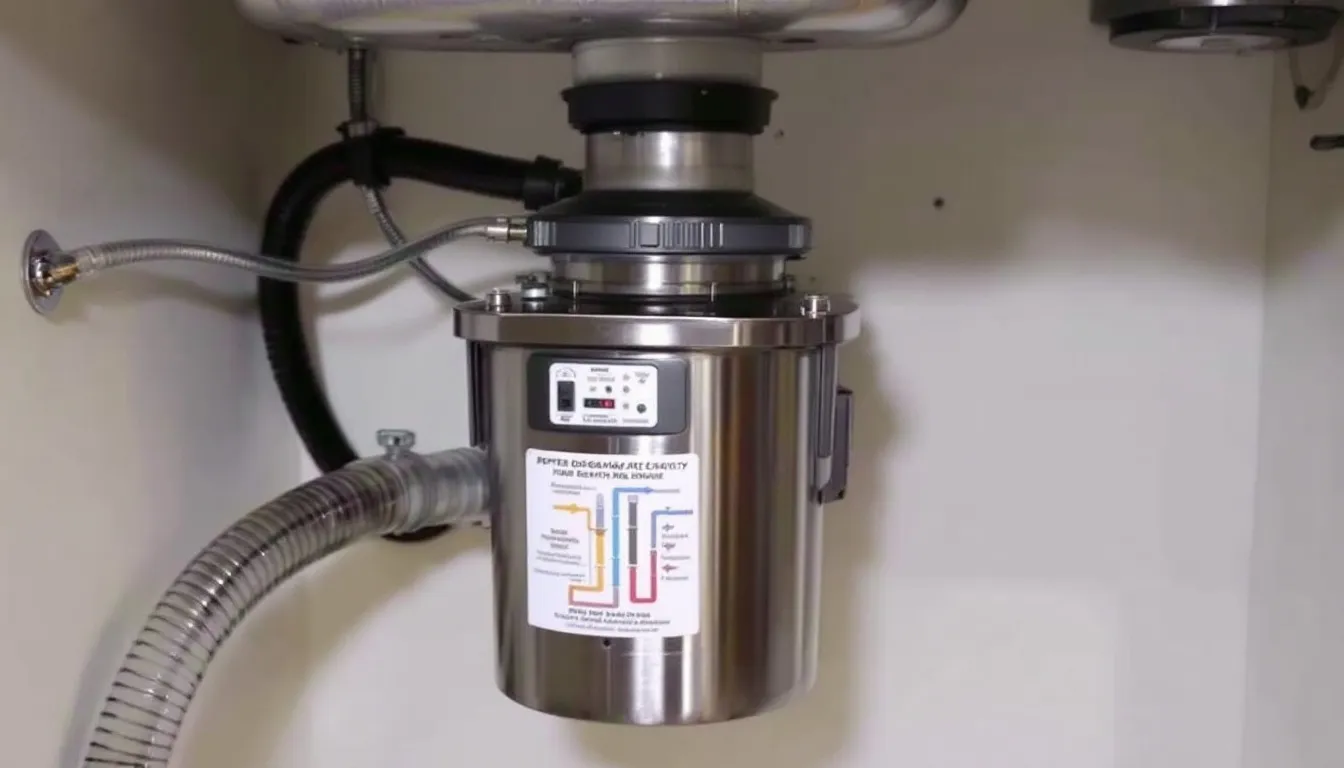
Specialty garbage disposals, such as septic assist garbage disposal models, are engineered to lessen the strain on septic systems. They boost enzyme levels and disposal’s grinding ability to grind food into finer particles, enhancing system efficiency. Some models even use injection technology to introduce enzyme-producing microorganisms, improving waste digestion.
Opt for septic-friendly designs with superior grinding action and high RPM. Modern solutions like the Sepura function as composting garbage disposals, collecting food scraps in an odor-free bin and keeping solids out of plumbing.
These innovations make using a garbage disposal with a septic tank more feasible.
Maintaining Your Septic System with a Garbage Disposal
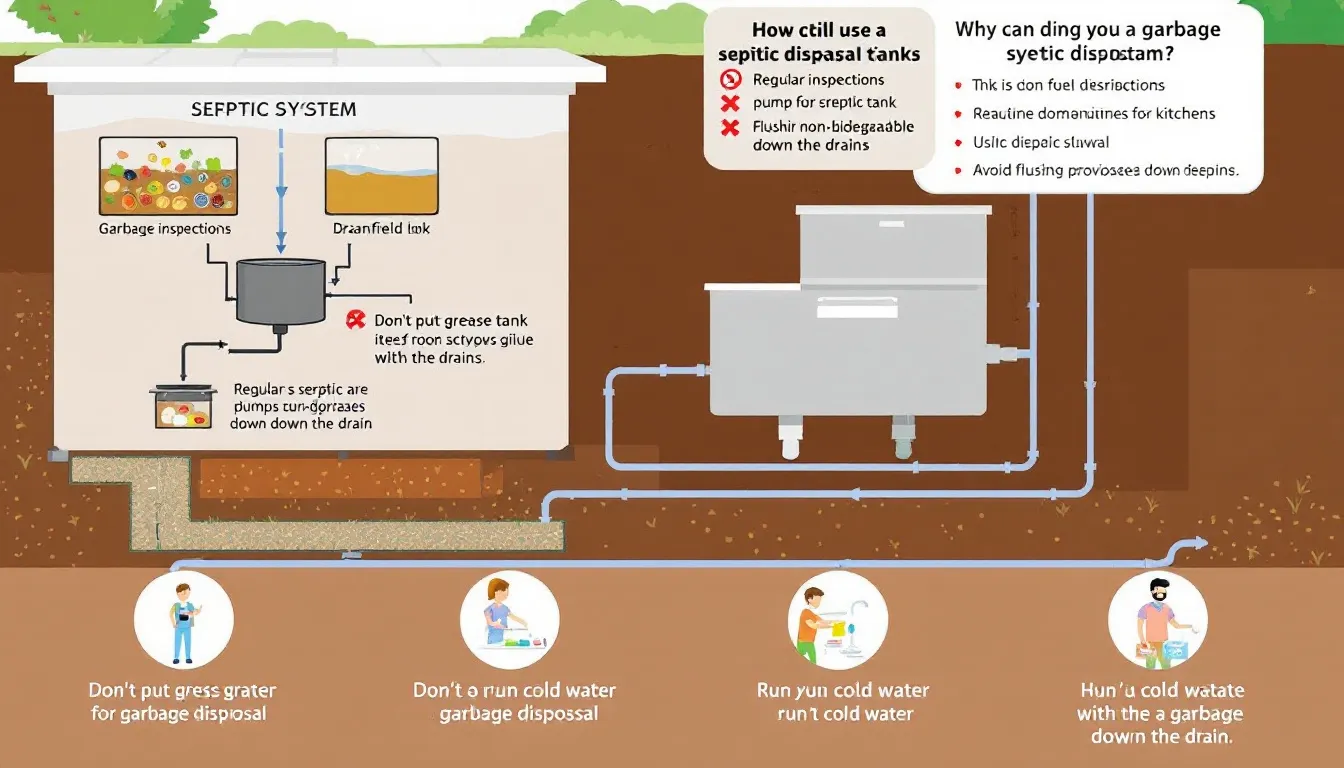
It is crucial to maintain both the garbage disposal and the septic system adequately. Operating the disposal with cold water helps avoid food waste adhering to the pipes. Adhering to guidelines provided by the manufacturer for maintenance can increase the longevity of your disposal.
Employing cold water consistently when grinding will deter grease from accumulating in your system. If odors are present, it may be a sign that cleaning is required due to accumulated food waste.
Studies have shown that septic systems equipped with garbage disposals do not require more frequent pumping compared to those without them. Conduct regular inspections and check sludge levels as part of routine upkeep. Establish good usage practices to ensure an extended lifespan for your septic system.
Alternatives to Using a Garbage Disposal
Using a standard trash can is an easy method to handle kitchen garbage. Utilizing sink strainers can stop food remnants from obstructing the drainage system effectively. For those interested in indoor composting, Bokashi bins offer a great solution through anaerobic fermentation.
Methods such as outdoor compost piles, rotating compost tumblers, and worm-driven composting systems are all environmentally friendly options that convert kitchen leftovers into valuable compost. The Green Cone digester encourages natural breakdown of waste and works well with septic systems.
By adopting these methods, you can efficiently deal with food scraps without relying on a garbage disposal unit for waste management.
Common Issues and Solutions
Utilizing a garbage disposal in conjunction with a septic system improperly can lead to an expedited buildup of sludge, necessitating more frequent upkeep. Food items that are not biodegradable may interfere with the bacterial equilibrium within the septic tank.
It’s essential to routinely check the levels of sludge for proper maintenance. In instances of clogged drains, basic strategies such as using a plunger or home remedies might be effective. Should these tactics fail, it is advisable to seek assistance from a qualified plumbing expert. Taking these measures helps prevent typical problems and promotes consistent functioning of the system.
Professional Services for Septic Tank Maintenance
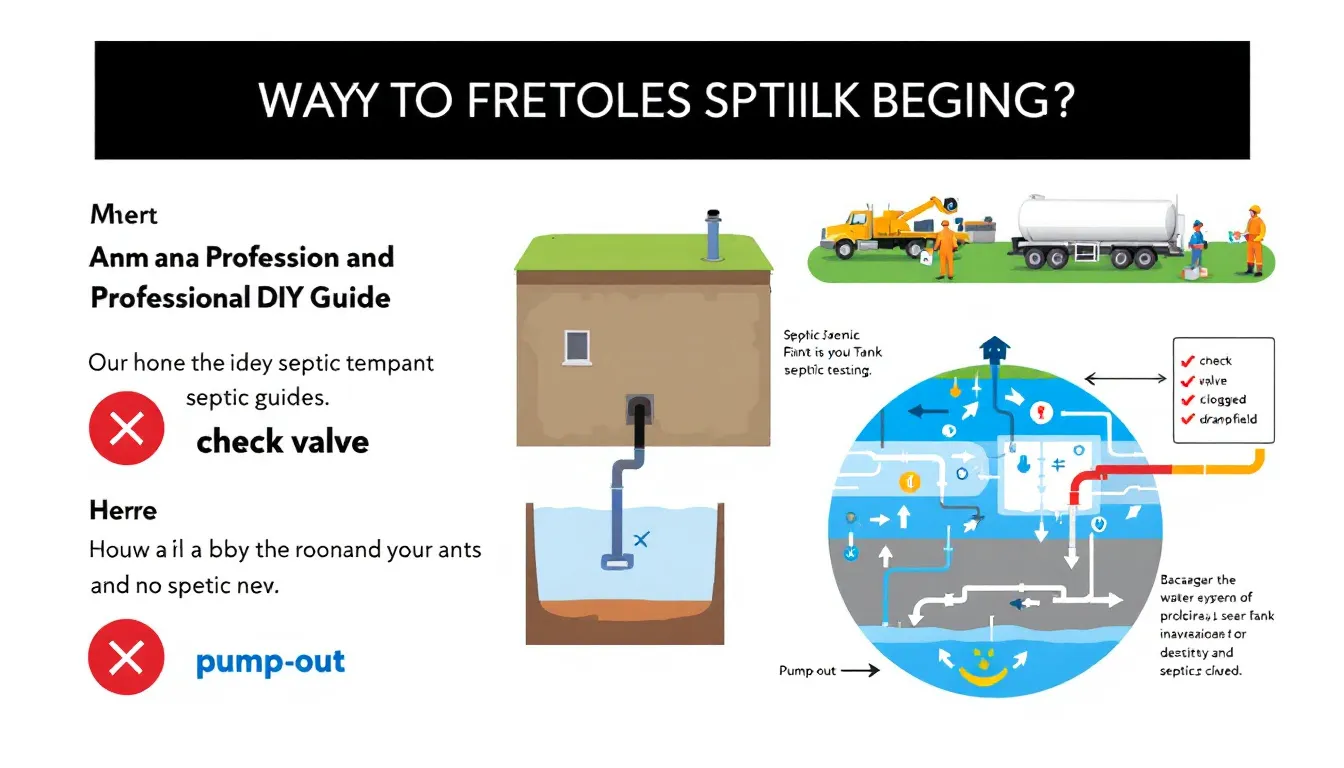
It is essential for expert technicians to perform periodic evaluations of septic systems, checking the accumulation of sludge and arranging for its removal when necessary. Numerous companies provide complimentary assessments at your location to determine the requirements for upkeep and fix-ups. These seasoned experts use advanced tools to appropriately extract and handle waste from the septic tank in accordance with regional regulations regarding disposal.
By adhering to a schedule of regular maintenance carried out by professionals, you can extend the life expectancy of your septic system while avoiding expensive malfunctions that necessitate repairs.
Summary
It is feasible to maintain both the handiness of a garbage disposal and the effective operation of a septic system through careful use and diligent upkeep. Recognizing the consequences that grinding food waste has on your system, exercising caution with what you put down the disposal, and being aware of which foods are acceptable for discarding are essential practices.
Investing in specialized disposals made specifically for septic systems can make a significant difference, as does ensuring routine expert maintenance checks. Considering other methods such as composting could provide beneficial alternatives. Adhering to these guidelines allows you to take advantage of contemporary kitchen amenities while still safeguarding the well-being of your septic system.
Frequently Asked Questions
Can I use a garbage disposal with a septic tank?
You can use a garbage disposal with a septic tank, but it requires careful management to avoid overloading the system.
Regular maintenance is essential for optimal performance.
What foods are safe to put down a garbage disposal linked to a septic tank?
It is safe to put easily biodegradable food scraps such as fruits, vegetables, and small amounts of bread and pasta down a garbage disposal linked to a septic tank.
These items break down efficiently, minimizing the risk of clogging the system.
How often should I pump my septic tank when using a garbage disposal?
If you use a garbage disposal, you should pump your septic tank every 1-2 years to prevent buildup and ensure proper functioning.
Regular maintenance is essential for a healthy septic system.
Are there special garbage disposals for septic systems?
Yes, septic assist garbage disposals are specifically designed to reduce strain on septic systems and enhance waste digestion. This ensures proper functionality while safely managing food waste.




